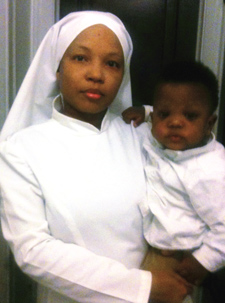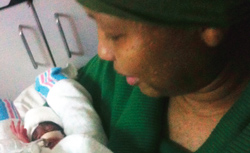Premature Babies and God’s Miracle
By Shawntell Muhammad | Last updated: Dec 12, 2012 - 4:49:07 PMWhat's your opinion on this article?

|

Shawntell Muhammad holds healthy son Razzaq one-year after his birth, and below she holds him as tiny infant one week after his birth.
|
According to a report from the March of Dimes, 15 million babies, or 12 percent of babies born in the United States, are premature. Premature babies are babies born before 37 completed weeks of pregnancy. Being born early interrupts the development of the lungs, as well as other organs, and the nervous system, which places these babies at great risk for developing serious health problems.
Some of the health problems premature babies face are:
Apnea. This is a pause in breathing for 20 seconds or more. Premature babies sometimes have apnea. It may happen alongside a slow heart rate.
Respiratory distress syndrome (RDS). This is a breathing problem most common in babies born before 34 weeks of pregnancy. Babies with RDS don’t have a protein called surfactant that keeps small air sacs in the lungs from collapsing.
Intraventricular hemorrhage (IVH). This is bleeding in the brain. It usually happens near the ventricles in the center of the brain. A ventricle is a space in the brain that’s filled with fluid.

|
Necrotizing enterocolitis (NEC). This is a problem with a baby’s intestines. It can cause feeding problems, a swollen belly and diarrhea. It sometimes happens two to three weeks after a premature birth.
Retinopathy of prematurity (ROP). This is an abnormal growth of blood vessels in the eye. ROP can lead to vision loss.
Jaundice. This is when a baby’s eyes and skin look yellow. A baby has jaundice when his liver isn’t fully developed or isn’t working well.
Anemia. This is when a baby doesn’t have enough healthy red blood cells to carry oxygen to the rest of the body.
Bronchopulmonary dysplasia (BPD). This is a lung condition that can develop in premature babies as well as babies who have treatment with a breathing machine. Babies with BPD sometimes develop fluid in the lungs, scarring and lung damage.
Infections. Premature babies often have trouble fighting off germs because their immune systems are not fully formed. Infections that may affect a premature baby include pneumonia, a lung infection; sepsis, a blood infection; and meningitis, an infection in the fluid around the brain and spinal cord.Long term health problems some premature babies will face include:
Autism. a group of disorders that affect a child’s speech, social skills, behavior
Intellectual disabilities
Cerebral palsy, a group of conditions that affect movement, balance and posture
Lung problems
Vision and hearing loss
There are also micro-preemie babies. These babies are born before 26 weeks of a completed pregnancy and/or weighing at least one pound and 12 ounces, or less. Micro-preemie babies face the same challenges as premature babies but their health problems are amplified. The survival rate of micro-preemie babies:
Born at 22 weeks: About 10 percent of babies survive
23 weeks: Fifty percent to 66 percent of babies survive
24 weeks: Sixty-six percent to 80 percent of babies survive
25 weeks: Seventy-five percent to 85 percent of babies survive
26 weeks: Over 90 percent of babies survive
Coming into the world October 19, 2011, Haaziq Qaim Muhammad was born at 24-weeks gestation, weighing one pound and four ounces.
Doctors told me and my husband James that there was a slim chance of the baby surviving.
Living his first 3 1/2 months of life in the hospital’s NICU (Neonatal Intensive Care Unit), Haaziq underwent surgery, blood transfusions, and having very immature lungs an oxygen machine assisted his breathing. From the day of his birth, Haaziq was given mother’s milk through feeding tubes for two months until he was able to nurse on his own.
Today, with very few health complications, Haaziq is enjoying life at home with his family. He is a fast learner and loves to play with cars and trucks.
The doctors and nurses refer to Haaziq as a “miracle baby.” Haaziq Qaim Muhammad is a living testimony that praying to Allah who appeared in the person of Master Fard Muhammad, definitely works.
(Shawntell Muhammad operates Organic Nourishment, which involves holistic grocery shopping tours, nutritional guidance, and a publication. For more information, e-mail [email protected].)
INSIDE STORIES AND REVIEWS
-
-
About Harriett ... and the Negro Hollywood Road Show
By Rabiah Muhammad, Guest Columnist » Full Story -
Skepticism greets Jay-Z, NFL talk of inspiring change
By Bryan 18X Crawford and Richard B. Muhammad The Final Call Newspaper @TheFinalCall » Full Story -
The painful problem of Black girls and suicide
By Charlene Muhammad -National Correspondent- » Full Story -
Exploitation of Innocence - Report: Perceptions, policies hurting Black girls
By Charlene Muhammad -National Correspondent- » Full Story -
Big Ballin: Big ideas fuel a father’s Big Baller Brand and brash business sense
By Bryan Crawford -Contributing Writer- » Full Story






 Click Here Stay Connected!
Click Here Stay Connected!








